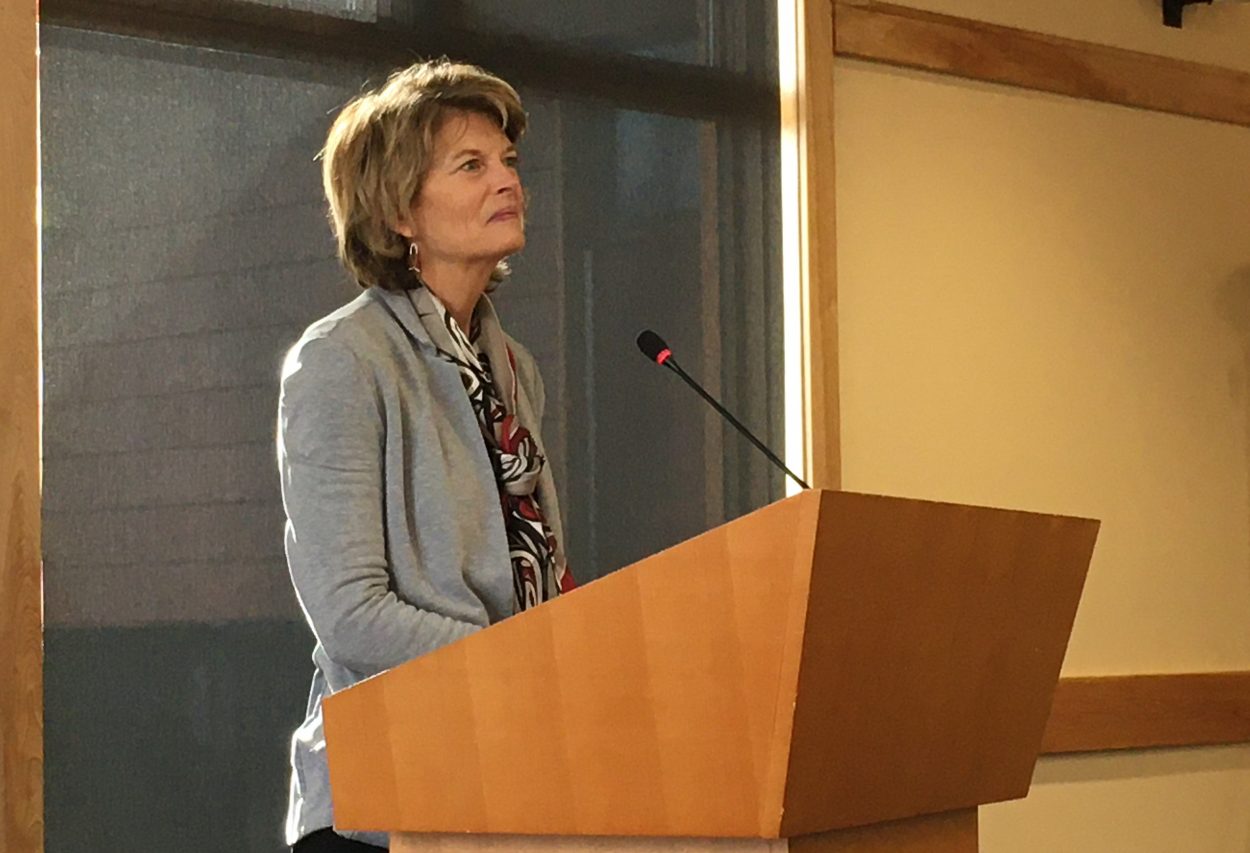
In the wake of the divisive politics surrounding the president’s impeachment, Sen. Lisa Murkowski says she is ready to get back to work on behalf of the state.
Alaska’s senior senator spoke to a crowd of over 100 attendees at a luncheon meeting of the Sitka Chamber of Commerce on Wednesday (2-19-20).
In public remarks during this latest congressional recess, Sen. Murkowski has openly acknowledged that the past few months have not been among her best as a lawmaker.
“It has been ugly in Washington DC. It has been as difficult and contentious a time as any I have seen in my 17 years in the United States Senate. And it has permeated all activities of government.”
For a time, Murkowski captured national attention when she defied Senate majority leader Mitch McConnell, who had said the impeachment trial would be held in coordination with the White House legal team. Murkowski cried foul, and argued for impartiality. But in the end, she fell into line with other Republican senators in voting against allowing high-profile witnesses to testify during the trial.
In a statement shortly before the controversial vote, Murkowski expressed dismay over a failure in government. She explained her position further to the Sitka Chamber.
“What I was hearing from Alaskans was: I am absolutely, positively you gotta get rid of him yesterday, to He’s the best president that we’ve ever had don’t touch him, and folks somewhere in the middle. But everyone saying, Would you please not forget that we sent you back there to work, too? So don’t forget to do that in the midst of all the partisan fighting and hating that is going on.”
Murkowski kept the rest of her program upbeat, focusing on concrete accomplishments like a two-year extension of the Secure Rural Schools program, which contributes around half-a-million dollars to the city and schools budget each year. The funding always has to be finessed in the senate, since it benefits a handful of western states with large amounts of public lands.
“Well this is one of those provisions that we don’t have much support for outside of about 11 states. And so it’s always a hard feat to accomplish,” she said.
Murkowski said that Alaska would see $22 million in Secure Rural Schools funding over the next two years.
Murkowski did not steer away from controversy in her remarks. Born in Ketchikan, she’s an unapologetic advocate for exempting Alaska’s national forests from the Roadless Rule. But she’s careful to frame her support for the exemption with a nod to the many who disagree with her.
“This is not about making sure that we have access to clearcut every acre of the Tongass,” said Murkowski. “It’s not that way; it’s not intended to be that way, and it won’t be applicable that way. When you combine the national monument and the natural setting land designations, over 13 million acres of the Tongass are already explicitly restricted from resource development, or required to be managed as roadless areas. That doesn’t change. That’s about 80-percent of the forest.”
The Sitka Assembly in November passed a resolution supporting the “No Action” alternative for the proposed Alaska exemption from the Roadless Rule. The Secretary of Agriculture is expected to make a decision on the exemption later this year.
Murkowski found her way to issues where there is more universal support: She talked about the labeling requirements for genetically engineered salmon available to consumers in grocery stores; she vowed that the Coast Guard would never again serve without pay — as they did last year — if the president shut down the government. And she called NOAA’s plan to designate the waters of Southeast Alaska as critical habitat for a Mexican subpopulation of humpback whales a “threat.” She said it was an example of bad science leading to bad policy.
But her remarks on the Alaska Marine Highway hit home especially with the Sitka Chamber audience, and brought her some applause.
“You cannot talk about access in this state without recognizing that in this part of the state, so much of what happens with commerce moves on the water,” said Murkowski. “And so a sustainable, viable marine highway system is a priority, and has to be a critical priority.” (Applause) “Thank you. It’s a big deal.”
Murkowski admitted that it wasn’t really her role to drive state policy on ferries. She noted, however, that the latest federal highway transportation bill included $88 million for ferry terminal improvements nationwide.
In a time of unprecedented divisiveness in the nation’s capital, Murkowski believes she’s well-positioned to put government back on the rails. Chair of the Senate Energy and Natural Resources Committee for the last six years, Murkowski said she had moved 17 “hugely bipartisan” bills out of committee — bills on renewable power, energy storage, and microgrids.
“What everybody’s looking for is something that people can gather together and support and not fight over, and so they’re looking to the Energy Committee for guidance there,” she said.
After her remarks to the Sitka Chamber, Sen. Murkowski spent an hour in a talking circle at Sitka’s alternative high school, Pacific High, followed by a closed meeting with community leaders.






























